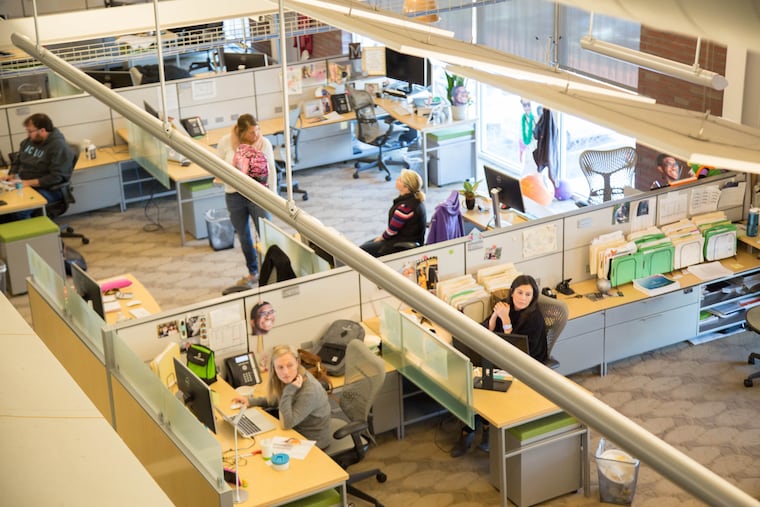16 weeks paid parental leave? Here’s why one tech company is doing it.
Forget foosball: parental leave is the new hip tech company perk.

ShopRunner's parental leave policy wasn't great and Lindsay Verstegen knew it.
When she arrived in January 2017, new parents at billionaire and Sixers co-owner Michael Rubin's e-commerce company could get partially paid leave through short-term disability.
That's why when the company, which has headquarters in Chicago and an office in Conshohocken, hired her to head human relations, or "people," as tech companies call it, improving the policy was one of her priorities.
But Verstegen, with the memory of her own "dark days of new motherhood" still fresh in her mind, wanted to make sure she was being objective and focusing on an issue that was meaningful to the company, not just something that was top of mind for her.
"As a woman at work, you're like, 'Is this the right thing to advocate for right now,' because there's a lot of things you could be doing," said Verstegen, 36, who's based in Chicago and formerly ran the hiring process for financial payments company Braintree, which is part of PayPal.
Ultimately, she made the call, as she puts it, to "own her perspective." When she joined the company, she estimates, about a quarter of the 70 employees were either parents or soon to be. The company was embarking on a major hiring push — in the next 18 months, it would double in size. Dealing with the challenge of hiring and retaining the best talent in a field where there's "negative unemployment" makes benefits like a competitive parental leave policy a no-brainer, she said. And she also knew how important that early time with a new child is.
In the spring of 2017, the company implemented its new policy: 16 weeks of paid leave for mothers who give birth and eight weeks paid for adoptive parents and co-parents. So far, seven employees have used the benefit, Verstegen said.
How tech companies are leading the way
Paid parental leave is on the rise in the United States, a country that does not mandate it. (The Family Medical Leave Act requires employers with a certain number of employees to allow workers to take leave that's unpaid. Some states — New Jersey, but not Pennsylvania — provide for four to six weeks of partially paid leave, though in 2017, Washington, D.C. and Washington state passed more robust policies that cover parents for longer and are closer to fully paid.)
Locally, Vanguard began offering 16 weeks of paid leave for mothers in 2016, a mix of ten weeks of short-term disability and six weeks paid leave. That same year, Campbell Soup Co. announced 10 weeks of paid leave for a primary caregiver.
Tech companies like Netflix, Twitter, and Facebook have led the way, all having offered more than 16 weeks of paid leave for the last few years. But Verstegen said she hoped ShopRunner could also help set standards in the industry.
If more tech companies improve their policies, she said, "it becomes the way the game is played."
Recent data show that companies are increasing benefits faster than they're increasing wages, and human resources professionals say that bonuses and policies such as parental leave are a way for companies to sweeten the deal for employees without raising pay. Still, policies that focus on a maturing workforce and require a significant amount of resources are a far cry from the stereotypical foosball table and kegs the tech scene has become known for (and which, it seems, have fallen out of favor).
"You live through something like parental leave, and the foosball table doesn't really mean much," she said.
ShopRunner's dedication to a first-rate parental leave policy reflects its workforce: Most of the 140 employees have more than 10 years of experience, she says. In other words, it's not a room full of 23-year-olds.
Still, the gains made in parental leave have typically affected higher-wage workers and don't often apply to part-time workers or contractors. (ShopRunner, which doesn't run any fulfillment centers, doesn't have any part-timers, according to a spokesperson, though it does have some temporary workers and contractors. The policy doesn't apply to them. Verstegen said the company is not as focused on a policy for those workers because there are so few at ShopRunner.) About 6 percent of American low-wage workers have access to paid leave, according to advocacy organization Paid Leave for the U.S.
But Microsoft recently announced that it would require the companies that supply it with subcontractors, like custodial staff, to offer 12 weeks of paid parental leave, leaving some to wonder if other tech companies would follow suit. Verstegen said ShopRunner is in early discussions around how it could adopt a similar policy.
What happens after leave?
The other work in progress is a standardized policy around how to prepare for an employee's leave and subsequent return.
The idea, Verstegen said, is not that employees will "pick up where they left off" but instead "be welcomed back by grace and compassion." It's about normalizing the act of taking leave so that there's a better chance new mothers will continue on their career trajectory despite the major life change.
Right now, because only a small number of people have taken the leave, the reentry process has been customized to each individual, but Verstegen plans to formalize a process around educating managers dealing with employees taking leave.
So far, employees have discussed with their managers what would work best for them: Would checking in a few times during leave make them feel more comfortable or more stressed out? Might they need a part-time or temporary person to fill in for them? It's important to allow space for nuance, Verstegen said, because it's such a personal experience.
And she’d know — she just got back from maternity leave after having her second child.